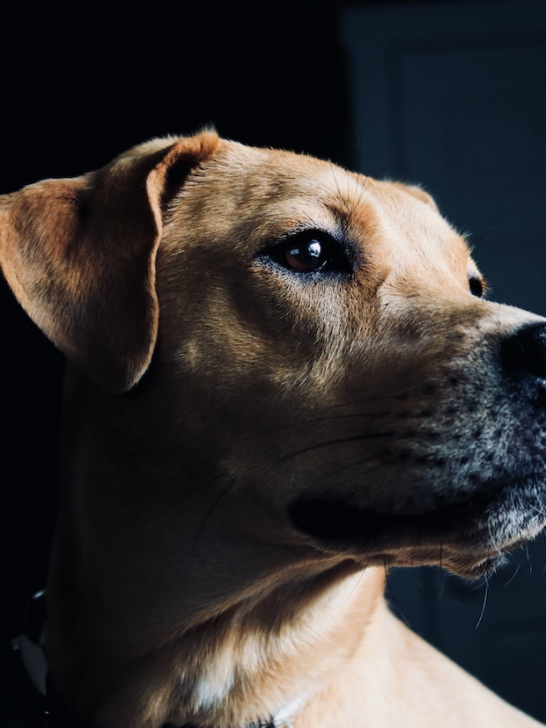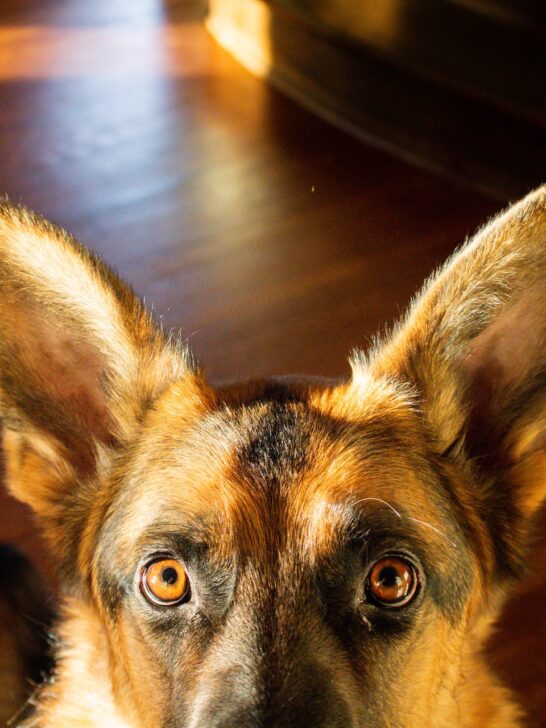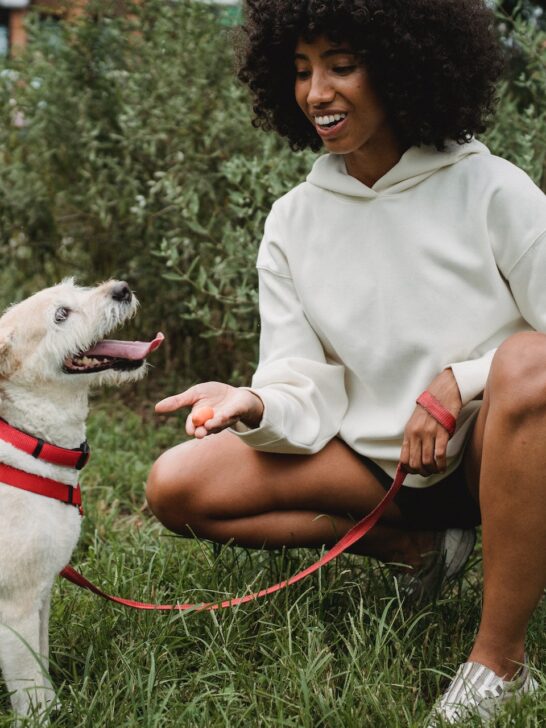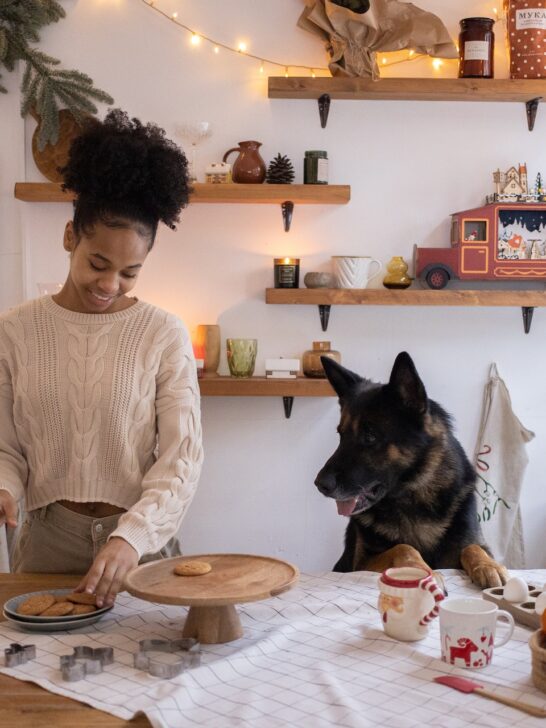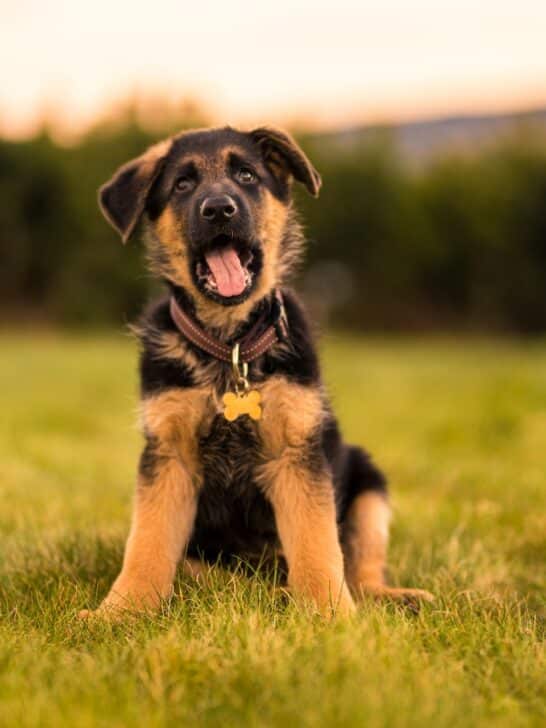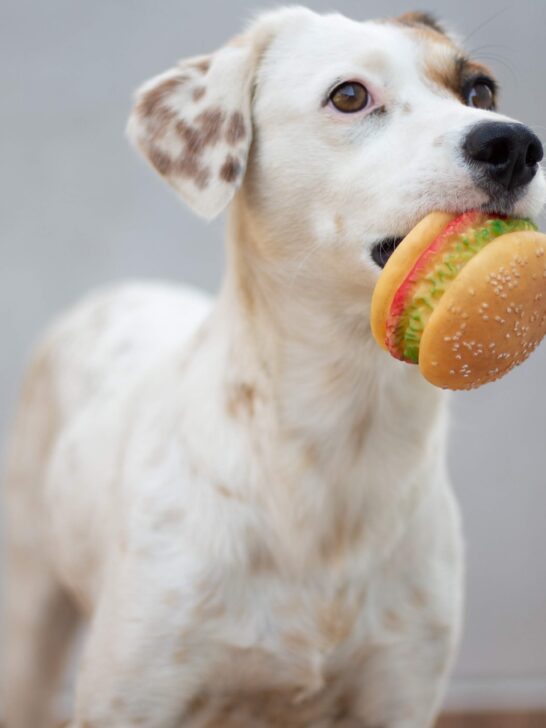8-Week-Old German Shepherd – Routine And Care
German Shepherds are among the most popular, loyal, and courageous dogs.
But if you consider getting a German Shepherd dog, keep in mind that they require extra care and attention, especially when they are tiny puppies.
For instance, an 8-week-old German Shepherd that has just started to develop needs a lot of patience and dedication from their owner.
Otherwise, they won’t be able to showcase their personality and establish a routine, let alone become obedient.
This article will share tips on caring for your German Shepherd puppy. We’ll cover training tips, food requirements, and health issues. Let’s get started!
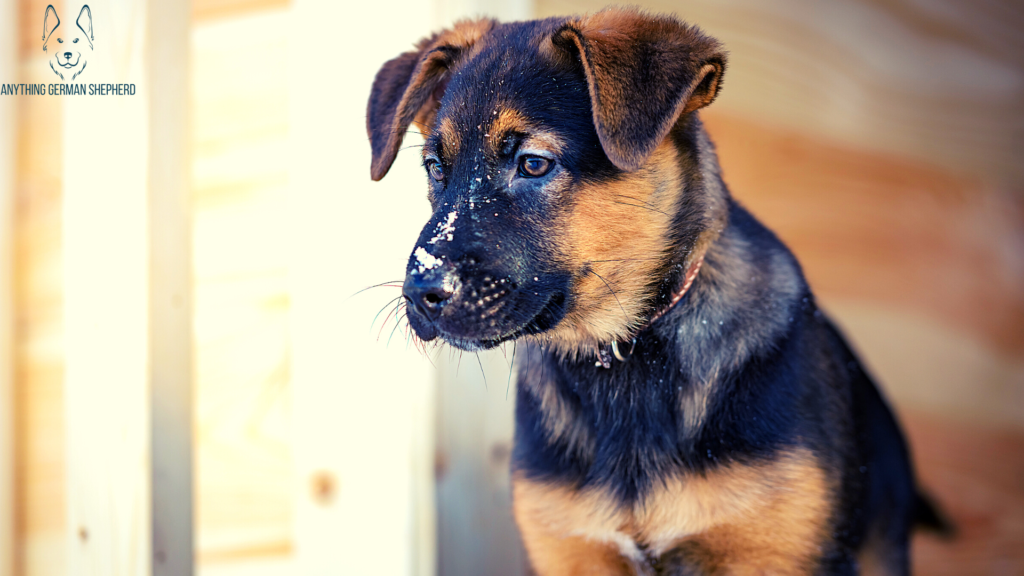
How to Potty Train Your 8-week-old German Shepherd Puppy
Potty training your 8-week-old German Shepherd can be stressful at first, but with a bit of persistence and patience, your puppy will learn correct behavior in no time.
Let’s go through some major points to remember when puppy training.
Assign a Designated Potty Area
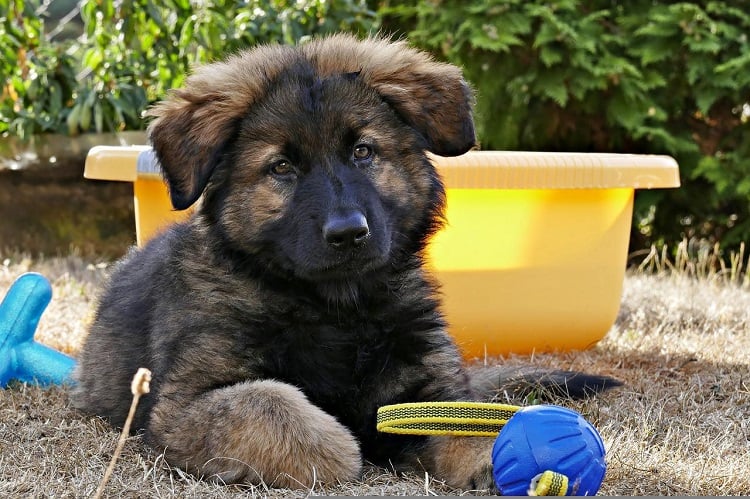
Choose a designated potty area for your German Shepherd puppy. The potty area can be outdoors or indoors. Select a location that’s easily accessible and that your dog can get to without too much difficulty.
Once you’ve chosen a potty area, stick with it and do not allow your German Shepherd puppy to use any other places for elimination.
Having a designated potty place will help your dog understand that this is the only place they should go to poop or pee.
Watch Out for Signs
One of the first signs is usually an increased awareness of their surroundings. You may notice that your puppy starts sniffing around more often or seems particularly interested in certain places of the house.
Watch out also for changes in behavior. If your pup suddenly starts having accidents inside or seems antsy and restless, they may be trying to tell you that they need to go outside.
Use Cue Words
One way to help your new puppy understand what you want him to do is to use cue words. Cue words will help your German Shepherd puppy learn the connection between the words and the action.
For example, if you want him to go potty outside, you can say basic commands like “go potty” or “go outside” as he’s going. You can also use cue words when rewarding him for going in the right spot.
For instance, you might say “good boy” or “good job” while giving him a treat.
Give Training Treats
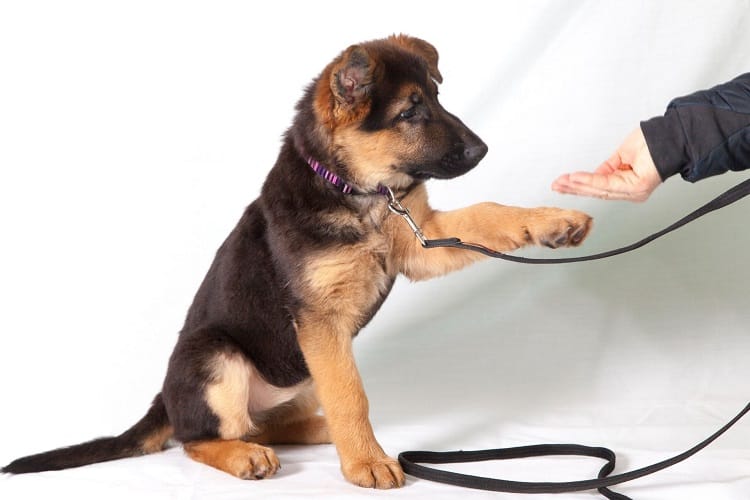
When potty training your puppy, use treats as a form of positive reinforcement. Doing this teaches your puppy that good things happen when they go outside to do their business.
When choosing treats for potty training, select something small and easy to eat. This way, the puppy can eat the treat quickly and then get back to playing.
It would be best if you also chose training treats that your puppy finds irresistible. Otherwise, they may not be motivated to keep trying.
You can also give your puppy a good belly rub while giving words of praise like “Good job” or “Well done, buddy.”
Regular Feeding Schedule
By establishing regular mealtimes, you’ll better predict when your puppy needs to go outside to relieve themselves.
It’s also important to avoid feeding your puppy too much food at once, as this can make it more difficult for them to control their bladder. When it’s time to eat, place their food bowl in front of them and allow them to eat at their own pace.
Puppy Crate
It is an enclosure to confine your new puppy for short periods. It is also helpful in transporting puppies from one place to another.
German Shepherd owners use it for crate training as they can also help with separation anxiety and boredom. A crate can help with your puppy’s overall training, including potty training.
Puppy crates usually have a removable tray on the bottom for easy cleaning. They also have wire, plastic, or fabric as the primary materials, and they typically come in different sizes to accommodate puppies of different ages and breeds.
When buying a crate, it must be big enough for the puppy to stand up, turn around, and lie down but small enough so that the puppy does not have too much space to eliminate in one corner and sleep in the other.
When used correctly, it can provide a safe, comfortable space for your new furry friend.
8-Week-Old German Shepherd Puppy Schedule
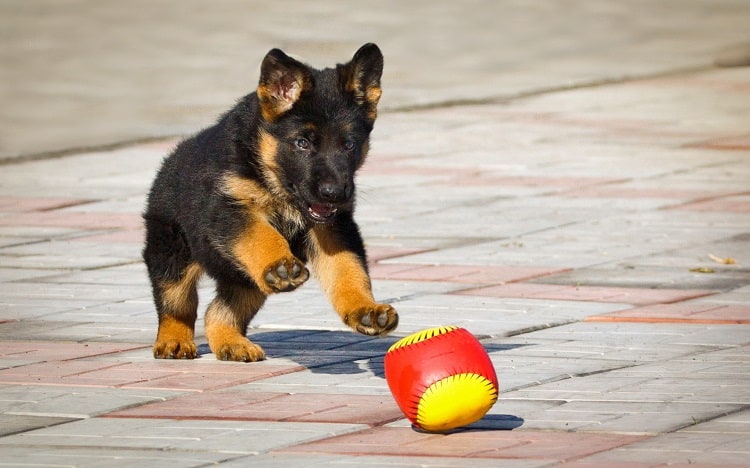
Here’s what the daily schedule of your puppy needs to look like.
Early Morning: Bring your Puppy Outside
When your German Shepherd is a still puppy, he may have trouble holding his bladder throughout the night. If you do not let your puppy out early enough, it might create potty accidents because he cannot control their bladder.
One way to solve this is to make the first potty break a part of your puppy’s morning routine by teaching him to hold his bladder.
Morning: Time for a Nutritious Breakfast
Puppies need a lot of nutrients to grow up healthy and strong. A nutritious breakfast helps them get the energy they need to start the day.
After a nutritious breakfast, take your dog on a potty break so it doesn’t have accidents in the house.
Dogs are creatures of habit, so if you make potty breaks part of their daily routine, they’ll quickly learn to do it themselves.
Mid-Morning: Small Meal and Lots of Cuddles
Feed your German puppy again in the late morning. Even though puppies spend most of their time sleeping and cuddling, puppies require several daily feedings.
Place your puppy on your lap and snuggle while sleeping. It would be best if you also let them rest throughout the day.
Afternoon: Lunchtime
Take your puppy outside after lunch to relieve themselves. Allow your puppy time to exercise and release any built-up energy. Feeding your puppy 1-1.5 cups at once is best to prevent overfeeding.
Midday: Snooze and Training in Between
It’s typical for your German Shepherd puppy to fall asleep during the day, but the best snooze time for them is in the middle of the day.
Between naps, you can do playtime and training activities to help release energy, encourage physical activity, and develop a strong bond between you and your German Shepherd.
Evening: Last meal of the Day
During the evening, feed your puppy their fourth and last meal. Allow your puppy’s supper to settle for a few minutes before taking them outside to potty and get some exercise.
Afterward, take your puppy for a short stroll. Before returning, have your puppy go potty outside, then snuggle up on the sofa for some quality time.
It’s an excellent way to burn off any extra energy in the evening.
Night: Potty Break Before Bedtime
Take your puppy out for one more potty time before putting him to bed. Remember that you should establish a reasonable bedtime for your puppy early on.
Food Requirements for an 8-Week-Old German Shepherd Puppy
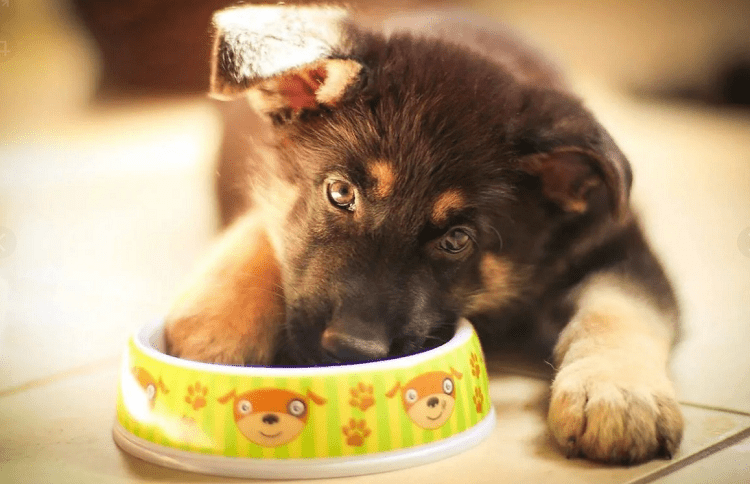
By the time he reaches eight weeks old, the weaning period of your German Shepherd puppy is already complete. You may introduce him to other puppy food, and it should not depend on his mother’s milk.
Feed your puppy hard kibble moistened with warm goat’s milk. This goat’s milk is easily digestible and gives your growing puppy all of the vital vitamins and minerals your puppy needs during this crucial development phase.
Moreover, an 8-week-old German Shepherd may develop a better appetite for other solid meals.
To pique your dog’s interest, offer him only a few tiny spoonfuls of canned plain pumpkin, unsweetened Greek yogurt, or cooked oatmeal.
You can give your German Shepherd up to 2 cups daily, but don’t be shocked if he doesn’t finish it all.
German Shepherd Puppy – Health Issues

There are several health issues to watch out for when you get a German Shepherd puppy. These include constipation, bloating, and diarrhea. Let’s go through them one by one.
Diarrhea
Diarrhea is a common problem that many German Shepherd puppies face. This condition has several possible causes, including dietary indiscretion, viral infections, and intestinal parasites.
In most cases, diarrhea is not a serious concern and will resolve itself within a few days. However, seek veterinary care if your puppy displays other symptoms such as lethargy, vomiting, or lack of appetite.
Constipation
A young German Shepherd is particularly susceptible to constipation due to their large, muscular build and fast metabolism. If your puppy is constipated, you may notice that he has difficulty passing stool and seems uncomfortable or restless.
If your puppy is constipated, take him to the vet for treatment. The vet may give him a laxative or enema to help relieve constipation.
Bloating
Bloating occurs when the stomach fills with gas, causing it to swell. German Shepherds are especially prone to bloating because of their deep chests.
There are several possible causes of bloating, including eating too fast, drinking too much water, and exercising immediately after eating. Stress can also be a factor.
To prevent bloating, feed your German Shepherd several small meals daily instead of one large meal.
It is also important to avoid exercising immediately after eating and ensure that your dog has access to fresh water.
Can a German Shepherd Puppy Start Training at 8 Months?
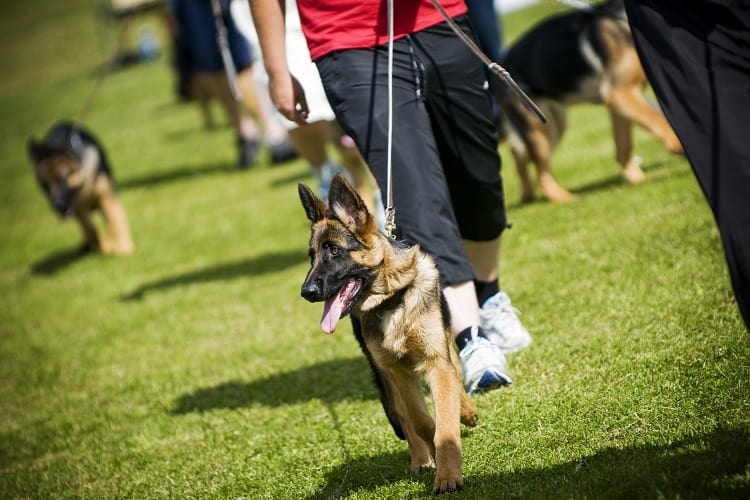
Yes, a German Shepherd puppy can start training at eight months. But remember that every puppy is different and will learn at its own pace.
The earlier you start training, the better, but don’t be discouraged if your puppy doesn’t pick things up as quickly as you’d like.
Consistency is key, and with patience, your puppy will get the hang of obedience training in no time. Training should be a bonding experience for you and your pup! Remember to have fun and keep it light.
How Long Does an 8-Week-Old German Shepherd Sleep?
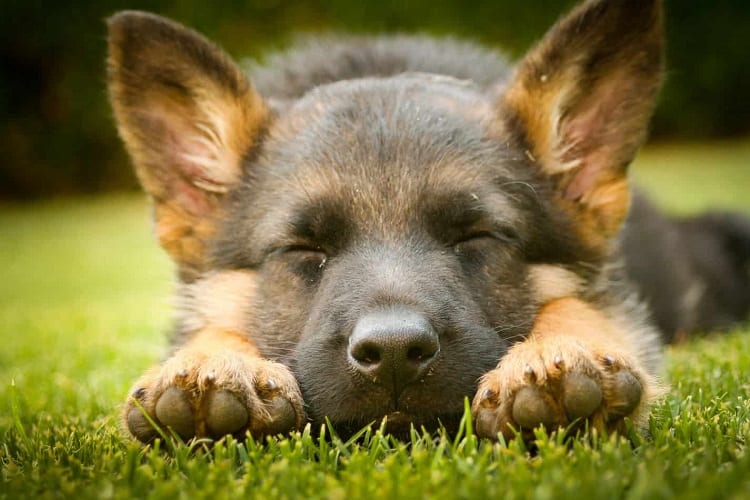
At eight weeks old, a German Shepherd puppy sleeps for around 18 hours daily. It may seem like a lot, but puppies need a lot of sleep to grow and develop properly.
As they get older, German Shepherds will sleep for less time each day.
Why Is My 8-Week-Old German Shepherd Puppy Biting?
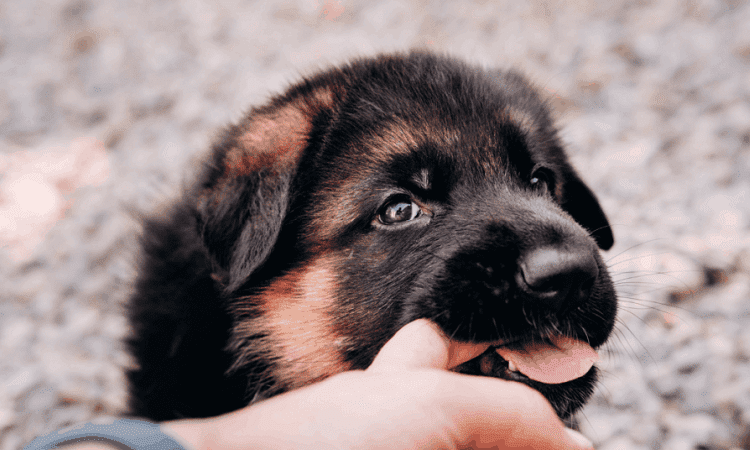
German Shepherd puppies use their mouths to explore their surroundings and socialize with other dogs and people.
In addition, puppies typically start teething around eight weeks old, which can cause them to bite more as they try to relieve the discomfort caused by their emerging teeth.
Puppies also explore the world with their mouths, and biting is a way for them to learn about their environment.
In addition, puppies may bite out of excitement or frustration, especially if they are not getting enough exercise.
If your puppy is biting excessively, provide him with plenty of chew toys and opportunities to run and play.
Also read:
- How to Take Care of a 1-Month-Old German Shepherd Puppy
- How to Take Care of a 3-Month-Old German Shepherd
- How to Take Care of a 4-Month-Old German Shepherd
Conclusion
We hope this article has helped prepare you even a little for the responsibilities and obstacles that will inevitably arise when caring for an 8-week-old German Shepherd puppy.
Remember, consistency is critical. Don’t forget to have fun and take tons of pictures; they won’t be that small and cute for long.
Resources:
FAQ:
1. What are some tips for potty training an 8-week-old German Shepherd puppy?
– Assign a designated potty area and stick with it
– Watch out for signs that your puppy needs to go outside
– Use cue words to help your puppy understand what you want him to do
– Give training treats as positive reinforcement
– Establish a regular feeding schedule to predict when your puppy needs to go outside
2. What is a puppy crate, and how can it help with training?
– A puppy crate is an enclosure to confine your new puppy for short periods.
– It can help with crate training, separation anxiety, boredom, and potty training.
– When buying a crate, it must be big enough for the puppy to stand up, turn around, and lie down but small enough so that the puppy does not have too much space to eliminate in one corner and sleep in the other.
3. What is the daily schedule for an 8-week-old German Shepherd puppy?
– Early morning: take your puppy outside
– Morning: give your puppy a nutritious breakfast and take him on a potty break
– Mid-morning: feed your puppy a small meal and give lots of cuddles
– Afternoon: take your puppy outside after lunch for exercise and another potty break
– Midday: playtime and training activities
– Evening: feed your puppy their fourth and last meal and take them for a short walk – Night: take your puppy out for one last potty break before bed
4. What are some common health issues with German Shepherd puppies, and how can they be prevented or treated?
– Diarrhea: caused by dietary indiscretion, viral infections, and intestinal parasites. Seek veterinary care if your puppy displays other symptoms such as lethargy, vomiting, or lack of appetite.
– Constipation: due to their large, muscular build and fast metabolism. Take him to the vet for treatment if your puppy is constipated.
– Bloating: caused by eating too fast, drinking too much water, exercising immediately after eating, or stress. Prevent bloating, feed your German Shepherd several small meals daily, avoid exercising immediately after eating and ensure that your dog has access to fresh water.
5. Can a German Shepherd puppy start training at 8 months?
– Yes, a German Shepherd puppy can start training at eight months.
– Every puppy is different and will learn at its own pace.
– Consistency is key, and with patience, your puppy will get the hang of obedience training in no time.
























